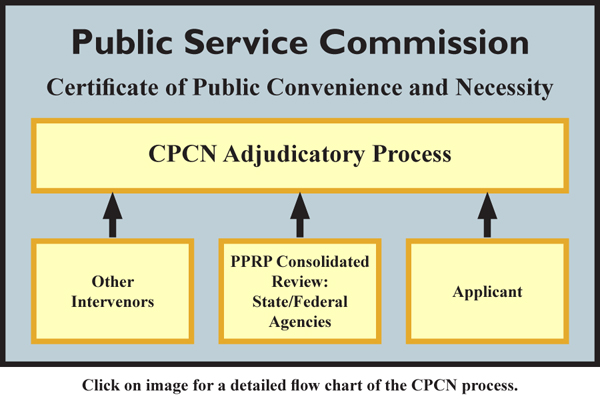Power Plant Research Program is responsible for coordinating the state's
comprehensive review of proposed power generating and transmission
facilities, and presents a consolidated state position before the Public Service
Commission
in licensing cases. Power Plant Research Program's
coordination with an applicant for a new or modified power or transmission
facility usually begins before the formal Certificate of Public
Convenience and Necessity process is initiated (see
the figure below). The program typically
meets with the applicant to discuss an anticipated
project and ensure that all issues are identified and any necessary studies are
conducted prior to submittal of the application. This coordination should
take place well before the initiation of any adjudicatory process.
This pre-application coordination is very important for both large
and small projects and provides an opportunity
to greatly streamline the process.
 The application consists of direct testimony
filed by the applicant in anticipation of an adjudicatory process before
the Public Service
Commission. The application summarizes the proposed project and its impacts, as described in
Public Service
Commission regulations. The
testimony is traditionally accompanied by an environmental review document
that presents the applicant's environmental and socioeconomic studies
The application consists of direct testimony
filed by the applicant in anticipation of an adjudicatory process before
the Public Service
Commission. The application summarizes the proposed project and its impacts, as described in
Public Service
Commission regulations. The
testimony is traditionally accompanied by an environmental review document
that presents the applicant's environmental and socioeconomic studies
The certificate of public
convenience and necessity constitutes permission to construct
the facility, and includes issuance of the required air quality
and water appropriations permits. Relevant operating permits
can be obtained simultaneously.
Cases before the commission are structured as administrative
law proceedings before a Hearing Examiner, with lawyers representing the various parties involved. Parties to a case include the applicant, Power Pant Research Program (acting on behalf of
the Department of Natural Resources and other state agencies), the Public Service
Commission Staff, and the Office of People's
Counsel (acting on behalf of the Maryland ratepayers). Other groups, such as federal agencies and private environmental
organizations, as well as individuals, have a right to participate in the
Public Service
Commission hearing process. Any such parties can file testimony, participate in cross-examination of other
parties, and file briefs with the commission summarizing their position and any
objections they may have regarding the proposed project. The process is flexible. Phasing,
waivers, and specific scheduling requests can be addressed in a
pre-hearing conference or at various points along the process.
Once the application is filed, Power Plant Research Program reviews the
testimony and the associated information on environmental, engineering,
and socioeconomic impacts provided by the applicant.
The program is also capable of replicating studies in any issue areas
which are potentially important to Maryland. The commission schedules a hearing at which all the parties to the
proceeding actively participate and file their findings as formal
testimony.
The direct testimony sponsored by the program describes the analyses that
the state performed to determine potential environmental and socioeconomic
impacts from the proposed facility. These findings are subject to cross-examination by any other parties to the
case. As part of this testimony, the program recommends to
the commission a number of special conditions to be included with the Certificate of Public
Convenience and Necessity, if
one is recommended to be issued. All
interested state agencies have an opportunity to review the application,
and to review and provide comments to the program before direct testimony is
filed. Because air quality and water appropriations permits are part
of the Certificate of Public
Convenience and Necessity, the conditions presented to the commission incorporate
recommendations governing air emissions and the quantity of water that can
be withdrawn from surface or ground water. Many state agencies have input to the recommended conditions,
including the Departments of Agriculture, Business and Employment
Development, Environment, Natural Resources, and Transportation, as well
as the Maryland Office of Planning and the Maryland Energy Administration.
The
Public Service
Commission's Hearing Examiner takes into consideration the
license conditions recommended by the state, and the testimony and briefs
filed by the applicant and all other parties, and issues a decision in the
form of a proposed order on whether the Certificate of Public
Convenience and Necessity should be granted and under
what conditions. After an
appeal period, a final order is released.